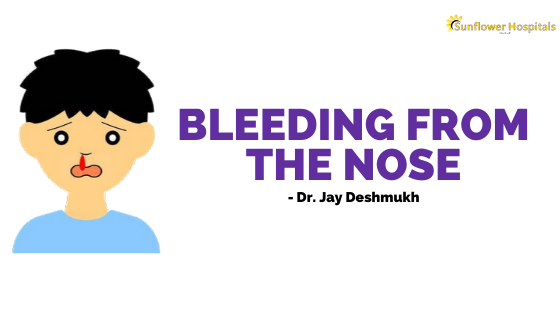What are the types of nose bleeds?
Dr. Jay Deshmukh:- There are two types of nose bleeds. The one that originates from the front of the nose, the second originates from the back of the nasal passage, near the throat. The anterior bleeds or the ones from the nose are mild and more common than the posterior ones that occur in the throat and can be massive. Children do not usually get the nosebleeds from the throat.
When to get medical help?
Dr. Jay Deshmukh:- If home remedies do not help, the next alternative is to seek help from health caregivers. If the bleeding is massive, if the individual is pale, fatigued or disoriented then ember gency care is a must. If you are on anticoagulants like warfarin, clopidogrel, aspirin, dabigatran, rivaroxaban then you need to see your doctor immediately. Individuals with low platelet count or bleeding disorders should seek prompt medical attention. If nose bleed is accompanied by fever then avoid aspirin and administration of paracetamol would be safer. Individuals with nose bleed accompanied by high blood pressure should be advised absolute rest and kept under observation.
What are the home remedies before you approach a doctor?
The first step is not to panic. Be calm and composed. Sit and slightly bend forward at the waist. Do not lie down or tilt your head back. Grip the soft part of both the nostrils at the bottom of the nose. Do not grip the bony bridge of your nose. Do not apply pressure to only one side though you may bleed from one nostril. Squeeze your nose closed for at least 10 to 15 minutes. Do not release the pressure to see if the bleeding has stopped. The application of ice packs or cold compresses to the bridge of the nose may help. This may help the blood vessels constrict. If the nose continues to bleed even after applying pressure for 15 minutes then repeat the above procedure once more. Apply pressure for at least 30 minutes. Seek urgent medical care if not better.
What are the causes of recurrent nose bleeds?
This can be caused by com stent exposure to dry air, consistently using steroid nasal sprays, recurring common cold or snorting chemicals in the nose like cocaine or tobacco products.
How to prevent the recurrence of nasal bleed?
Recurrent nose bleeds can occur in some individuals. Using a humidifier in the room particularly when the air is very dry may help. Keep your nose moist using a saline nasal spray or gel. Avoid picking your nose or clip your fingernails to avoid injury
Can high blood pressure cause nose bleed?
Dr. Jay Deshmukh:- Many individuals with hypertension often get extremely panicky if they have nose bleeds. The fright caused by seeing fresh red blood itself rais es their blood pressure. There is no convincing data to prove that high blood pressure can lead to nose bleed. However low ering of blood pressure gradually to normal levels certainly helps.
What are the less common but more serious causes of nasal bleeds?
Dr. Jay Deshmukh:- Patients with abnormal blood cells like in blood cancer or with low platelet counts may bleed from the nose. Typhoid fever, dengue, severe sepsis may be accompanied by nose bleeds. Wegener’s Granulomatosis, local malignancy in the sinuses can cause a nasal bleed though they are rare. Alcohol and heart failure can increase the incidence of nose bleeds. Whom to approach if you get nasal bleed? Besides of course your family doctor, an ENT specialist should be consulted for recurrent nose bleeds or if the cause of nose bleed is unclear. Some blood tests, at times Xrays of the sinuses and scans, may be required. Nose bleeds are common. One should not get panicky if this happens. A methodical approach is required to treat and diagnose nasal bleed. The causes vary from such innocuous situations like common cold to a serious one like blood cancer or local malignancy.


